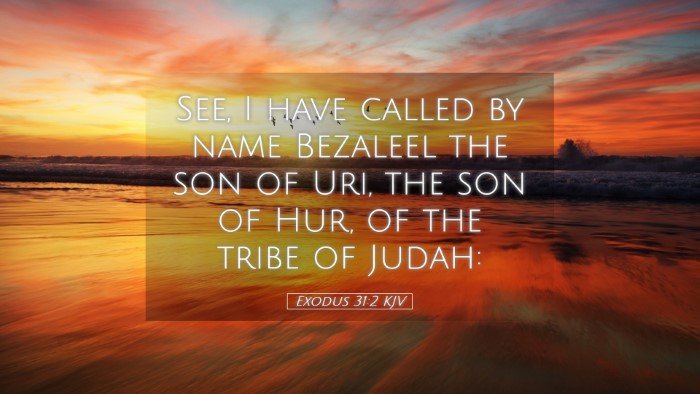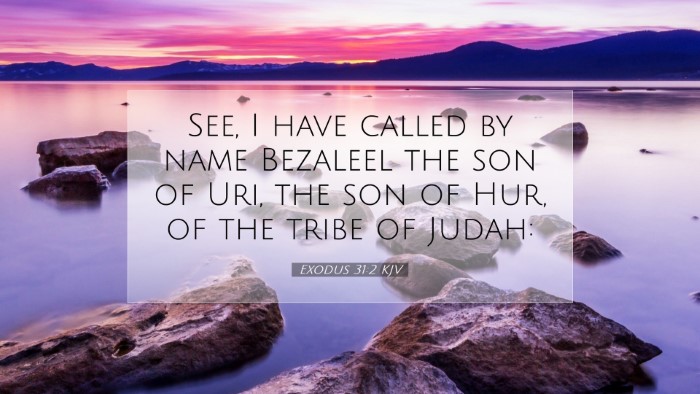Commentary on Exodus 31:2
Exodus 31:2: "See, I have called by name Bezaleel the son of Uri, the son of Hur, of the tribe of Judah."
Contextual Overview
The book of Exodus narrates the story of the Israelites' liberation from Egyptian slavery and their covenant relationship with God. In chapter 31, God emphasizes the importance of craftsmanship in the construction of the Tabernacle, which symbolizes His presence among His people. This verse marks God's personal selection of Bezaleel, a skilled artisan tasked with the work of the Tabernacle, demonstrating God's acknowledgment of human talent as integral to divine service.
Divine Selection of Bezaleel
The mention of Bezaleel's lineage is significant. Matthew Henry remarks that God’s mention of Bezaleel's ancestry - his father Uri, and grandfather Hur - reflects not only the legitimacy of his role but also the heritage of his capabilities. It serves as a reminder that God's choices often come from families of faith and dedication.
Albert Barnes adds that Bezaleel's calling was not merely about skilled craftsmanship but a divinely ordained appointment, showing that true artistic talent, especially in spiritual contexts, is a gift from God and is meant for His glory.
The Role of Bezaleel
Bezaleel was chosen to lead all aspects of artistic and architectural creation for the Tabernacle. Adam Clarke expounds on the implications of this role, stating that Bezaleel was an overseer of not only the materials and designs but also of the artisans who would execute the work. His leadership signifies that God values not just the finished product but also the integrity of the process and the relationships formed within it.
Spiritual Implications
Henry reflects on the spiritual lessons from this verse, pointing out that every believer is called, appointed, and equipped for specific tasks within God’s plans. This theme encourages individuals to recognize their unique gifts and contributions to the body of Christ. Furthermore, the inclusion of a craftsman in God’s plan signifies that all work, even that which seems secular, can be sacred when done for God’s honor.
Barnes notes that the mention of the tribe of Judah is significant, symbolizing leadership and praise. Being chosen from this tribe serves as a reminder that God often uses those from prominent backgrounds to fulfill His plans. This notion encourages individuals from every walk of life to step forward, trusting that God can use them regardless of their origin.
Application for Today’s Believers
The calling of Bezaleel encourages modern believers to embrace their vocational callings in a manner that honors God. Clarke comments on the spiritual application for Christians today, emphasizing that each believer is manifested with divine potential, called to serve in various capacities. This model encourages believers to explore their gifts and apply them in worship and service.
In the ministry, the verse highlights the importance of recognizing and affirming the spiritual gifts in church members. The early church thrived because individuals utilized their talents to glorify God. Pastors and church leaders are encouraged to identify and nurture these gifts in their congregations, just as God recognized Bezaleel’s competencies.
Conclusion: The Call to Creativity in God's Service
Exodus 31:2 exemplifies a significant moment where God entrusts human skill with divine purpose. Matthew Henry concludes that every task done for God, whether simple or intricate, is important in His narrative. This verse serves as an enduring reminder of God's desire to work through people who are dedicated, skillful, and faithful.
Deriving insights from this passage, it is evident that God equips those He calls. With the assurance of divine empowerment, pastors, students, theologians, and all believers are invited to respond creatively and courageously to their calling in service to God and His people.


